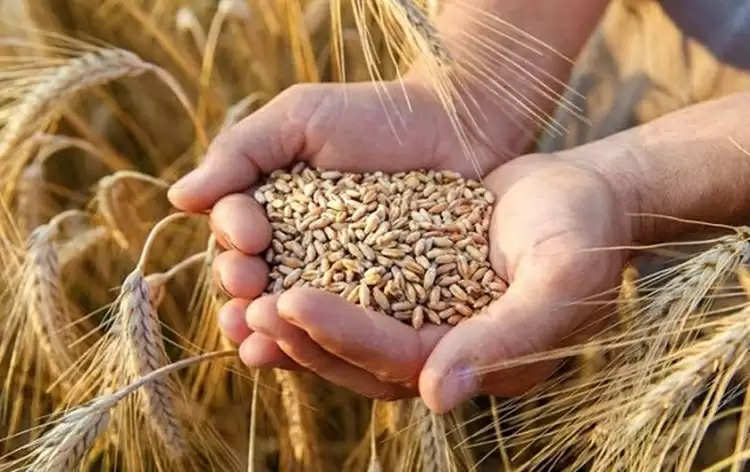Since the moratorium, India has sent 1.8 million tonnes of wheat to the following nations: Sudhanshu Pandey, food secretary

Since the country's embargo on the sale of the grain on May 13, India has sold 1.8 million tonnes of wheat to a dozen or more nations, including Bangladesh and Afghanistan, according to Food Secretary Sudhanshu Pandey.
In contrast to the commitment of 50,000 tonnes, he claimed, about 33,000 tonnes of wheat had already been given to Afghanistan as humanitarian help.
On June 24, Pandey said India has always taken the needs of the world into consideration, even while meeting the onerous obligations of feeding its population of 1.38 billion people, according to an official statement. He was speaking at a ministerial conference on "uniting for global food security" that was held in Berlin, Germany.
"It is important to clarify here that the recent decision by the Government of India (GoI) to bring about regulation on wheat exports was primarily taken to protect domestic availability as well as availability to vulnerable countries to whom supplies cannot be ensured by market forces," the secretary said.
Nevertheless, he said, India has remained committed to meeting supply obligations already made as well as to provide for the legitimate needs of nearby nations and countries with a food shortage.
"After the regulation this fiscal year until June 22nd, 1.8 million tonnes of wheat have been shipped out, nearly four times as much as last year to countries including Afghanistan, Bangladesh, Bhutan, Israel, Indonesia, Malaysia, Nepal, Oman, Philippines, Qatar, South Korea, Sri Lanka, Sudan, Switzerland, Thailand, UAE, Vietnam, and Yemen," he said.
The administration abruptly stopped exporting wheat on May 13. All types of wheat, including high-protein durum, were changed from being "free" to being "prohibited" for export. The choice was made in an effort to rein in wheat's growing price on the domestic market.
According to him, India exported a record 7 million tonnes of wheat during the 2021–22 fiscal year, compared to its usual 2 million tonnes, or around 1% of the world's wheat trade.
Pandey said India continued to offer humanitarian relief throughout and after the epidemic, both through the supply of vaccinations as well as food consignments, stating that the country is keenly aware of its duties towards the most vulnerable in various areas of the world.
In the wake of the destruction brought on by the earthquake a few days ago, the nation has sent multiple shipments of humanitarian relief to the people of Afghanistan, including 33,000 tonnes of wheat out of a total commitment of 50,000 tonnes made by Prime Minister Narendra Modi, he said.
In order to improve their food security during the pandemic, he said, India has also given food aid in the form of wheat, rice, pulses, and lentils to a number of nations, including Afghanistan, Comoros, Djibouti, Eritrea, Lebanon, Madagascar, Malawi, Maldives, Myanmar, Sierra Leone, Sudan, South Sudan, Syria, Zambia, and Zimbabwe.
In order to provide food assistance to approximately 810 million people during the COVID pandemic, India launched what is arguably the greatest food support system in history.
"Even now, more than two years after we started, we are still giving food assistance to these needy people, who are equal to the combined population of Europe and the United States. The entire system was run on a vast technology platform that required biometric authentication to assure proper targeting, "added he.
India has recognized the UN Secretary General's efforts to improve global food security, the Secretary said, adding that the nation also supported the task team's recommendation to immediately waive food export limitations on purchases made by the World Food Programme for humanitarian help.
He added, "We have also stressed the significance of providing similar exemptions to all member nations and pertinent stakeholders who are supporting this global humanitarian effort."
Furthermore, according to Pandey, the COVID-19 epidemic has had a significant negative influence on food security worldwide, which has been made worse by current geopolitical events and the effects of climate change.
He added that the price of food, fertilizer, and fuel has increased in recent years. The world's most vulnerable people have been disproportionately affected, along with the poorest and least developed nations in the Global South.
In times of natural disasters, pandemics, and international wars brought on by climate change, he said, "recent occurrences have underlined the critical necessity for developing resilient and uninterrupted food supply networks, so as to secure both food security and nutritional security."
He added that India is genuinely attempting to implement a comprehensive approach to agriculture and make it more sustainable, particularly by boosting crop diversification and production techniques, as well as appropriate water and soil management.
He added that India is genuinely attempting to implement a comprehensive approach to agriculture and make it more sustainable, particularly by boosting crop diversification and production techniques, as well as appropriate water and soil management.
Through crop evaluation and the digitalization of land records, digital technology is now significantly contributing to the empowerment of Indian farmers. Post-harvest infrastructure has also been improved, in part due to the establishment of an Agriculture Infrastructure Fund with a $1 trillion budget, a 35 million tonne cold chain storage facility, and a scheme to build silos with a 12 million tonne capacity.
According to him, the adoption of waste utilization, resource recovery, and circular economies in the food industry are only a few of the sustainable food processing technologies being used to lower the overall carbon footprint.
.png)